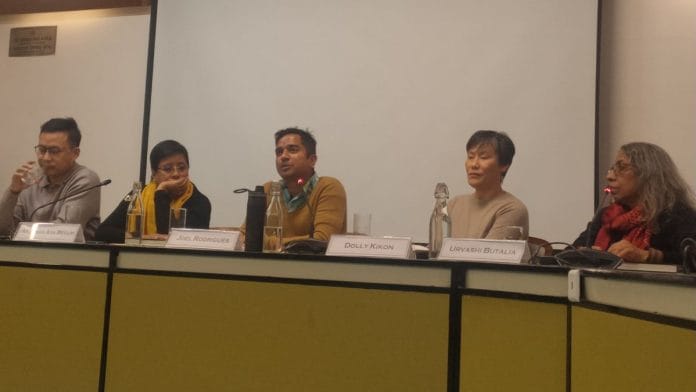New Delhi: Rice beer, often celebrated at festivals and upscale restaurants, hides a bitter truth. For many in Nagaland, the stigma of brewing it overshadows its heritage.
“My grandmother brewed rice beer for hospitality using homegrown rice from our land,” said Neivikhotso Chaya, researcher at the Department of Geology at Gauhati University, Assam.
“But now, in Nagaland’s towns, government-introduced high-yield varieties are used, almost exclusively, to brew beer. But buying it feels shameful because people assume you’re making alcohol, turning a tradition into a stigma,” said Chaya.
The double standards when it comes to food from the Northeast—elevated in restaurants but sneered at for their ‘smell’ in homes—was the focus of a panel discussion on the book, Food Journeys: Stories from the Heart at Delhi’s India International Centre on 3 December.
Co-edited by feminist anthropologist Dolly Kikon and peace researcher Joel Rodrigues, Food Journeys explores how food intersects with migration, identity, and discrimination. Contributors like Chaya, also a freelance editor on Earth and Environmental Sciences and Anjuman Ara Begum, an Associate Professor at the Royal School of Law and Administration, Assam, joined the discussion, unpacking the cultural and political significance of food.
The book, published by Zubaan Publications, explores how food acts as a lens to understand cultural identity, land politics, and justice, shedding light on the nuances of discrimination tied to Northeast Indian cuisine.
“When you mock someone’s food, you’re mocking their history, their identity, their way of life,” Begum said. “But when we hold onto our food, we’re holding onto our dignity. We’re saying that our stories matter. It’s a way of saying, ‘We’re still here’.”
Also read: Culture for one, taboo for another—MasterChef is now more Indian with Northeast on its plate
The politics of smell
The panel explored how food is weaponised to reinforce class and cultural hierarchies, particularly through the stigmatisation of “smelly” dishes. In metropolitan spaces, fermented foods from the Northeast often become symbols of discrimination and exclusion.
“As a student at Delhi University, I remember how our food was mocked. People held handkerchiefs to their noses, called it garbage, and used casteist slurs like Jangli to demean us,” Kikon said.
This disdain for unfamiliar smells is deeply rooted in cultural biases. Smell often becomes a tool to police and marginalise certain communities.
“The mockery wasn’t just about food—it was about who we were. It was their way of saying, ‘You don’t belong here’,” said Kikon.
Begum shared a similar observation, pointing out how the food of economically disadvantaged groups is often dismissed or ostracised. “In Guwahati, I’ve seen street vendors selling dried fish or fermented soybeans that are treated as though they’re dirty or inferior,” she said.
But when fermented foods like axone or dried fish are served in high-end restaurants, they are marketed as premium delicacies.
“It’s the same food, but the context changes everything,” Rodriguez said. “When it’s served in a fine-dining space, it’s no longer ‘smelly’—it’s sophisticated. That’s the hypocrisy of how class shapes our relationship with food.”
The panellists also discussed how food can serve as an entry point to dismantling these biases. “By celebrating these so-called smelly foods, we’re reclaiming their place in our culture,” Kikon said. “It’s about turning shame into pride, erasure into visibility.”
Also read:
Food as memory, resistance
For many young Northeasterners, particularly those who migrate to metropolitan areas, food becomes a site of struggle. Rodriguez described how students are often expected to represent their culture through regional dishes at festivals. “People assume you know how to cook your ‘traditional’ food, even if you’ve never lived that experience. It’s an unfair burden,” he said.
Food stories from the region also reflect themes of adaptation and resilience. Begum recounted the journey of Saleha, a climate refugee from Assam, who turned to making muri (puffed rice) after her village was swallowed by the Brahmaputra River.
“It wasn’t just about making money—it was about reclaiming dignity in the face of unimaginable loss,” said Begum.
For Rodriguez, food is deeply tied to memory and identity. In his Goan household, the kitchen was a fraught space where his mother faced abuse if her cooking failed to meet his father’s erratic and often harsh expectations. “You never knew what the ‘perfect’ Goan dish was—it depended on his mood or the alcohol in his system,” said Rodriguez.
This environment left him hesitant to cook, fearing judgement and failure. Yet, the kitchen also held moments of connection. Through stories, his mother taught him about their Goan heritage and the spices that defined their cuisine, even as he avoided cooking himself.
It wasn’t until he lived alone in Bengaluru and began cooking for friends—exhausted chefs from the Northeast—that his perspective shifted. Their gratitude for simple meals helped him see cooking as an act of care rather than a source of fear.
“Food, once filled with violence for me, became a way to heal,” said Rodriguez.
(Edited by Theres Sudeep)






